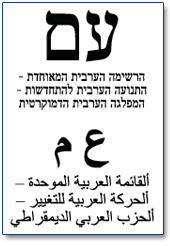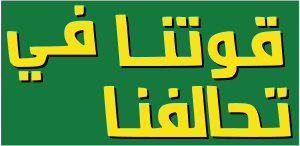United Arab List facts for kids
Quick facts for kids
United Arab List
הרשימה הערבית המאוחדת
القائمة العربية الموحدة |
|
|---|---|
 |
|
| Leader | Mansour Abbas |
| Chairman | Mansour Abbas |
| Founded | 1996 |
| Ideology |
|
| National affiliation | Joint List (2015–2019; 2020–2021) |
| Seats in Knesset |
5 / 120
|
| Election symbol | |
| עם عم |
|
| Website | |
| (archived) | |
The United Arab List is a political party in Israel. It is often called by its Hebrew name, Ra'am, which means "Thunder." The party represents the ideas of the Southern Branch of the Islamic Movement. It is known for being an Islamist and conservative party.
The party is led by Mansour Abbas. In 2021, Ra'am made history by joining the group of parties that formed Israel's government. This was a major event for Arab political parties in the country.
Contents
History of the Party
The United Arab List was created in 1996 before that year's election. It was formed by a partnership between the Arab Democratic Party and the southern part of the Islamic Movement. In its first election, the party won four seats in the Knesset, which is Israel's parliament.
In the 1999 election, the party did even better, winning five seats. However, some disagreements led to a few members leaving to start their own parties. By the 2003 election, the party's support had dropped, and it won only two seats.
For the 2006 election, Ra'am teamed up with another party, Ta'al. Together, they won four seats, with three going to Ra'am. They continued this partnership for the 2009 election and again won four seats.
In 2015, several Arab parties, including Ra'am, joined together to form the Joint List. They did this because a new rule made it harder for smaller parties to get into the Knesset. Ra'am was part of the Joint List for several elections.
Joining the Government
In the 2021 election, Ra'am ran by itself and won four seats. After the election, no single party had enough power to form a government alone. This made Ra'am's four seats very important.
On June 2, 2021, the party's leader, Mansour Abbas, signed an agreement to join a coalition government. This was the first time an independent Arab party had ever been part of Israel's ruling government. The agreement included promises to spend over 53 billion shekels (about $16 billion) to improve life in Arab towns. This money was for things like better roads, schools, and fighting crime.
In October 2021, the government approved a plan to spend $9.4 billion to help Israeli Arabs. The plan aimed to create more jobs and better healthcare. It also included another $1 billion to help reduce crime in Arab communities. Many people gave Ra'am and Mansour Abbas credit for this historic plan.
Back to Opposition
In the 2022 election, Ra'am won five seats, one more than before. However, the coalition government it was part of did not win enough seats to stay in power. As a result, Ra'am returned to being an opposition party. Opposition parties are those in the Knesset that are not part of the ruling government.
What the Party Believes
Ra'am is an Islamist party, which means its ideas are based on the religion of Islam. It is also a conservative party, meaning it supports traditional values.
Under its leader Mansour Abbas, the party focuses on improving the daily lives of Arab citizens in Israel. It works on issues like crime, jobs, housing, and public services. This is different from some other Arab parties that have focused more on the larger Israeli–Palestinian conflict.
The party supports the two-state solution. This is the idea of creating an independent Palestinian state in the West Bank and Gaza Strip, next to Israel.
Ra'am is very popular among the Negev Bedouin, who are Arab citizens living in the Negev desert. The party also gets a lot of support from religious and nationalist Arab Israelis. The Islamic Movement, which is connected to the party, helps get voters to the polls in many Arab towns and villages.
Election Results
This table shows how many votes and seats the United Arab List has won in different elections.
| Election | Leader | Votes | % | Seats | +/– | Status |
|---|---|---|---|---|---|---|
| 1996 | Abdulmalik Dehamshe | 89,514 | 2.93 |
2 / 120
|
– | Opposition |
| 1999 | 114,810 | 3.49 |
3 / 120
|
Opposition | ||
| 2003 | 65,551 | 2.08 |
1 / 120
|
Opposition | ||
| 2006 | Ibrahim Sarsur | 94,786 | 3.02 |
2 / 120
|
Opposition | |
| 2009 | 113,954 | 3.38 |
2 / 120
|
Opposition | ||
| 2013 | 138,450 | 3.65 |
3 / 120
|
Opposition | ||
| 2015 | Masud Ghnaim | with Joint List |
4 / 120
|
Opposition | ||
| Apr 2019 | Mansour Abbas | 143,666 | 3.31 |
2 / 120
|
Snap election | |
| Sep 2019 | with Joint List |
3 / 120
|
Snap election | |||
| 2020 | with Joint List |
4 / 120
|
Opposition | |||
| 2021 | 167,064 | 3.79 |
4 / 120
|
Coalition | ||
| 2022 | 193,916 | 4.07 |
5 / 120
|
Opposition | ||
Knesset Members
These are the people who currently represent the United Arab List in the Knesset.
- Mansour Abbas
- Walid Taha
- Waleed Alhwashla
- Iman Khatib-Yasin
- Yasser Hujirat
See also
 In Spanish: Lista Árabe Unida para niños
In Spanish: Lista Árabe Unida para niños
- Arab members of the Knesset



